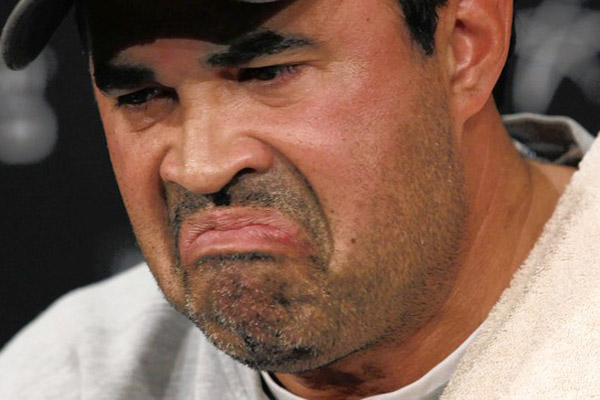
The big news in Chicago baseball is… what the former manager of the Chicago White Sox said about Fidel Castro (that, and, um… Darwin Barney hit a home run?). Perhaps there will be some news in Chicago about Chicago baseball this season, though I wouldn't expect much. For now, the press is pining for Ozzie's familiar quotations.
A friend asked: would Guillen's comments about Castro be news in any other city? No. For instance:
The Chairman of the Miami-Dade Board of Commissioners has called on Marlins owner Jeffrey Loria to urge Guillen to resign.
[snip]
"To say you respect Fidel Castro, suggests he also respects dictators such as Hugo Chavez, Daniel Ortega, Adolf Hitler and Saddam Hussein," the letter reads.
Um, about Hugo Chavez… there's some precedent for that.
He is on a first-name basis with Venezuela's leftist president, Hugo Chavez, who calls Guillen regularly to talk baseball. "He's Venezuela's biggest baseball fan," Guillen says.
It's the talk of Twitter and my fantasy baseball listserv, but the consensus seems to be that people are either irritated with the Marlins or just ambivalent towards the whole thing. Dave Zirin, the Nation's sports columnist, represents the irritated well:
Let’s leave aside the rather glaring irony that the politicians, sports commentators and Cuban exiles want to show their love of freedom by taking Guillen’s job for the crime of exercising free speech.
I'm ambivalent to the geopolitics of it, but oddly happy about the local political angle. Usually when sports teams get massive amounts of public money from local governments, the citizenry doesn't get anything from it besides higher taxes. And debt, which often outlives the stadiums themselves, and sometimes the teams:
New Jerseyans are hardly alone in paying for stadiums that no longer exist. Residents of Seattle’s King County owe more than $80 million for the Kingdome, which was razed in 2000. The story has been similar in Indianapolis and Philadelphia. In Houston, Kansas City, Mo., Memphis and Pittsburgh, residents are paying for stadiums and arenas that were abandoned by the teams they were built for.
During the 1990s, the Marlins ramped up their payroll, won a World Series, and immediately turned around and gutted their team, cutting their payroll 80 percent from 1997-1998 as owner Wayne Huizenga pled poverty while demanding a new stadium for the team. Sports economist Andrew Zimbalist looked at the numbers, saw accounting tricks, and estimated that the team had not lost $29.3 million, as Huizenga claimed, but had made $13.8 million from its World Series-winning team. A decade of negotiations with Miami and courting by other cities followed, and finally the deal was struck that got the new-look, new-manager Marlins their $600 million stadium.
$377 million comes from Miami-Dade County; $102 million from the city; and $120 million from the team. The SEC has shown some interest in how this all went down.
While the subpoenas issued by the SEC do not explicitly detail the purpose of the investigation, the feds’ motives are evident: They want to understand how, exactly, a group of county commissioners agreed to fund 80 percent of the Marlins new stadium, which cost more than $600 million, without ever seeing the team’s financial records – and whether bribes had anything to do with it.
Almost $500 million should buy you a lot. (It does get you a $20,000 parking lot to replace the street parking the stadium consumed, if you raise enough of a fuss.)
And after the chairman of the Miami-Dade Board of Commissioners (which financed 60 percent of the stadium) and the mayor of Miami (which financed about 20 percent) raised a stink, it apparently buys the power to get a manager suspended for five days. There's a bit of a bread-and-circuses angle to the furor, with an offhand comment by a manager famous for them consuming all of the political oxygen when there's so much more interesting stuff embodied by the stadium itself.
Then again, the public financing deal did play a role in the former mayor being yanked out of office in a recall, which passed with 76 percent of the vote. By comparison, a five-game suspension is nothing.
So as much as the deal may have been ill-considered, good for them for exercising some power over what they bought. That it's over Ozzie errata is disappointing, but the precedent is encouraging. Should the Cubs manage to rally and squeeze some money out of the city for Wrigley renovations, perhaps we can negotiate an Alfonso Soriano-Brett Jackson platoon, or arrange an Anthony Rizzo call-up if Bryan LaHair falters. Though we may have to goad Soriano into saying something about his affection for Rod Blagojevich first.
Photograph: Chicago Tribune



